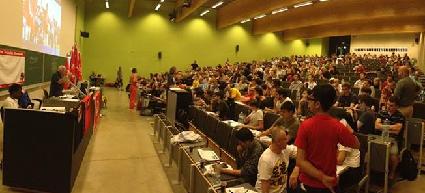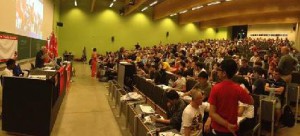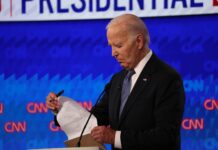Brazil, Venezuela, Cuba and Latin America
Laura Fitzgerald, Socialist Party (CWI Ireland)
Johan Rivas, CWI activist in Venezuela, introduced a discussion on Latin America at this year’s CWI Summer School. He noted the opening of a new period in the situation in Latin America as the ‘Great Recession’ hits the continent, particularly in the light of the onset of crisis in China, ushering in a new period of class struggle and capitalist crisis in the region. Part of this process includes, Johan contended, an intensification of imperialist wrangling and economic conflict in the tussle for influence in the region between China and the US. This backdrop is coinciding with an upturn in the class struggle – seen recently in a wave of massive strikes in Mexico in a struggle against the privatisation of the state oil company, and also in a general strike in Bolivia.
Venezuela after Chavez
Johan explained how the recent death of Hugo Chavez has resulted in a more complicated situation in Venezuela. One the one side, Chavez’s period in power saw social reforms, an activation and politicisation of the masses. On the other side, there is not only the right-wing opposition threatening to attack the gains of the masses (despite the right’s skillful attempts to hide their real reactionary character). There is also the bureaucracisation within the Chavez camp; the pro-capitalist layers who got rich over the last years, the corruption and cronyism. This is a process discrediting the ‘Bolivarian revolution’.
Following the 2006 election victory for Chavez, after the masses ensured the failure of an attempted right-wing coup, Johan explained that between 60% and 70% of the population supported nationalising the main sectors of the economy, and that up to 70% were positive about the idea of advancing towards socialism, even if there may have been a lack of a developed idea of what exactly that meant. Now, in 2013, Johan contended, consciousness has been pushed back as a result of the massive bureaucratisation of the regime that Chavez presided over. This took place after the implementation of some counter-reforms, and crucially, in the light of the really limited nature of the reforms that did take place due to wealth accrued through oil revenues and done in a fashion that did not significantly encroach on capitalist economic relations.
Johan raised the possibility that the complications resulting from this could result in a political comeback for the right that would most likely occur through electoral means, as opposed to another attempted right coup, although the latter can’t be completely ruled out. Such developments would have an effect, particularly on the masses in the neo-colonial world who did, to a degree, look to Chavez and Venezuela with hope and inspiration.
However, it is also the case that the right is somewhat divided currently which can hamper its successes in this year’s local elections. On the other hand, there are also fissures within the Chavista PSUV party, with a growing division between its military wing and its civilian wing. This is reflected in a certain shift to the left in some of the PSUV branches and rhetoric across the country. Johan explained how the CWI in Venezuela employs a range of tactics in its efforts to win the advanced sections of workers, the poor and youth to a revolutionary socialist programme. Such tactics include some element of work amongst the rank and file of the PSUV, and also work in building a united front of the Left outside of the PSUV, as CWI comrades fight for the adoption of a revolutionary programme inside of the latter.
New openness for Trotskyist ideas on Cuba
Johan then went out to give an account of his insight into the very interesting processes taking place in Cuba currently. Raul Castro has presided over a series of counter-reforms that have moved the economy in a capitalist direction but this process is by no means completed.
Johan noted how the youth are more supportive of political reforms, and the older generation are enormously sceptical and wary of any reforms, as they fear what they can mean for their prized health and education services, that represent the most important gains of the revolution. He also referred to reforms with the Cuban Communist Party itself – finally LGBT people can join and participate, resulting in an openly LGBT mayor being elected in one of the provinces, as a first since the revolution.
Johan illustrated the openness for a Trotskyist analysis of Stalinism; for the programme regarding the need for a political revolution to democratise the state and planned economy, for workers’ control and management of industry, and for such a change to link with a global perspective for a worldwide working class challenge to capitalism that can genuinely raise the prospect of democratic socialist change and socialism.
Convulsive explosions in Brazil
Ricardo Baross Filho, a trade unionist and activist with LSR (CWI in Brazil) in Rio de Janeiro, gave the second part of the introduction which focussed on the convulsive explosion of anti-government mass struggle across Brazil in recent weeks. Ricardo began his comments by putting ‘Lulaism’ into perspective. When elected ten years ago, Lula’s PT government offered the capitalists a save way out. Despite its former character as a workers’ party and the huge hopes of layers within workers and poor, the PT in government implemented neo-liberal policies, strict monetary targets, privatisations (less than the governments before, but still) and corruption.
The whole success of this model based on commodity exports, mainly raw commodities driven by Chinese demand.
Ricardo explained how the improvements in life that sections of the working class experienced were implemented in the spirit of neo-liberalism via state subsidies to private industry in the form of public private partnerships, to deliver house building and pay for places in private universities for youth.
The populism of Lula was illustrated in his incorporation of CUT (the major trade union congress) president into the government as minister for labour. The Brazilian ruling class aimed to continue on Lula’s course but the election of Dilma in 2010 marked a new chapter, Ricardo explained. Economic problems are surfacing and Dilma lacks the social base that Lula enjoyed. Dilma’s dwindling popularity is occurring in the context of a continued neo-liberal drive to undermine workers’ rights. This is illustrated by a proposed law that would put legal rights of workers (such as maternity leave rights, sick pay etc.) could be on the table in negotiations, allowing employers to demand their scrapping in individual workplaces.
Dilma’s growing unpopularity illustrates the undermining of ‘Lulaism’, which is significant given what his regime represented. This is compounded by economic problems – there was only 0.9% growth in GDP last year and projections for this year is for a mere 2% growth. Dilma’s reign has witnessed inflation, ensuring a big rise in the price of staple foods, a major issue for the poor masses of the country. Dilma has spoken about her ‘responsible’ fiscal approach – all debts will be paid etc. The reality is, Ricardo said, is that the shine had gone off the government and Brazilian capitalism even before the outbreak of recent mass struggle.
Outbreak of struggle
Ricardo noted that last year witnessed the highest number of strikes for many years. Extensive strikes took place in both the public and private sectors, including a two month long strike in federal universities. Before the major outbreak of mass struggle, a number of localised movements against fare hikes for public transport had been successful, giving confidence to workers and youth. Anger at the brutality meted out to the first wave of protesters by police in Sao Paulo helped the movement to spread extensively and intensively. Protests about fare hikes for public transport began to question the millions being spent on stadiums for the Olympics and World Cup, in contrast to the precious little spent on health and education.
Ricardo noted the incredible mass support that the protests enjoy – a recent poll suggested that 89% of the population are in support. Given the inexperience within the sheer mass nature of the protests – most participants were on their first protest – far-right elements tried to skilfully intervene with a view to hijacking the protest. LSR members, Ricardo explained, assisted in organising defence of the left wing activists from these fringe right elements. Ricardo also explained, however, the huge openness of the protesters, which has meant that LSR have grown significantly in numbers through its intervention into the movement. LSR is also raising that the task of the left in this movement is vital – its role is to ensure that the energy of the movement does not fade away – this movement represents an opportunity to build new organisations of and for the working class and youth that can become more important that the PT or CUT ever were.
PSOL
Ricardo also shed some light on our continued participation in the broad left party / left coalition, PSOL. Ricardo noted that PSOL brings together some impressive class fighters and leaders of social movements from across Brazil. The fact that it has been growing electorally in recent years illustrates its potential to be very important left pole in Brazil. The biggest threat to this, Ricardo noted, is a strong wing within the organisation that is pushing the organisation towards coalition with cuts-imposing forces.
Ricardo also advocated the need for a new trade union confederation in Brazil. He noted the inability of CUT to truly represent the workers’ needs. He spoke positively about the role of CSP-Conlutas that many LSR activists participate in, that in terms of programme and action is far ahead of the CUT. CSP-Conlutas also plays an important role in organising contract workers, unemployed youth, the social struggles and movements of the poor and linking such struggles to the trade union movement.
Discussion on the character of the movement in Brazil
The debate heard contributions from CWI activists from France, Brazil, Sweden, Austria and Germany. Topics covered included the political situation in Honduras, further analysis on the mass movements sweeping Brazil and points regarding the trade union movement and also the PSOL party, in Brazil. Christina, LSR activist, contributed to the debate by emphasising the role of youth in the protest movement in Brazil. She noted that a poll taken at the beginning of the demonstrations in Sao Paulo indicated that 71% were taking part in their first ever protest. Christina put youth participation in the protest movement in context by speaking about the difficulties of youth unemployment and precarious private sector work for young people, as well as the oppression, racism, police violence and degrading poverty experienced by black youth in the Favelas.
Mariana from France dealt with the question of nationalism in Brazil. She explained the inability of much of the left to deal with this issue. The presence of Brazilian flags at demonstrations represents, to a degree, the low level of consciousness that exists. Some on the left have faltered on this question, by either dismissing the protests as reactionary, or by simplistically referring to this feature as ‘anti-imperialist’. The reality is that ‘Lulaism’, an entirely bourgeois phenomenon, drummed up nationalism and a sense of togetherness that was designed to blur class lines and obscure class division in order to further the interests of capitalism, and disarm the working class. An overhang of this can exist, and is present in the movement, but also exists alongside a clear shift to the left in consciousness. A skilful intervention from the Left in the movement that expresses the aspirations of the working class and youth, that gives clear direction to the movement, and that raises the need for solidarity and struggle throughout Latin America and the world, can make a huge impact.
As the debate concluded the consensus that developed highlighted the new opportunities present in what is a new phase of crisis for capitalism in Latin America, and potentially a new chapter for the workers’ movement in the region. Comrades attested to the need for more discussion on perspectives regarding the contradictory processes at play in Cuba and Venezuela, and finally, the tremendous developments in Brazil. This key country which has a huge influence on the whole of Latin America economically and politically, was pointed to as an indication of the potential for socialist ideas and struggles to re-develop throughout this continent so rich in inspiring history of struggle and revolution.





